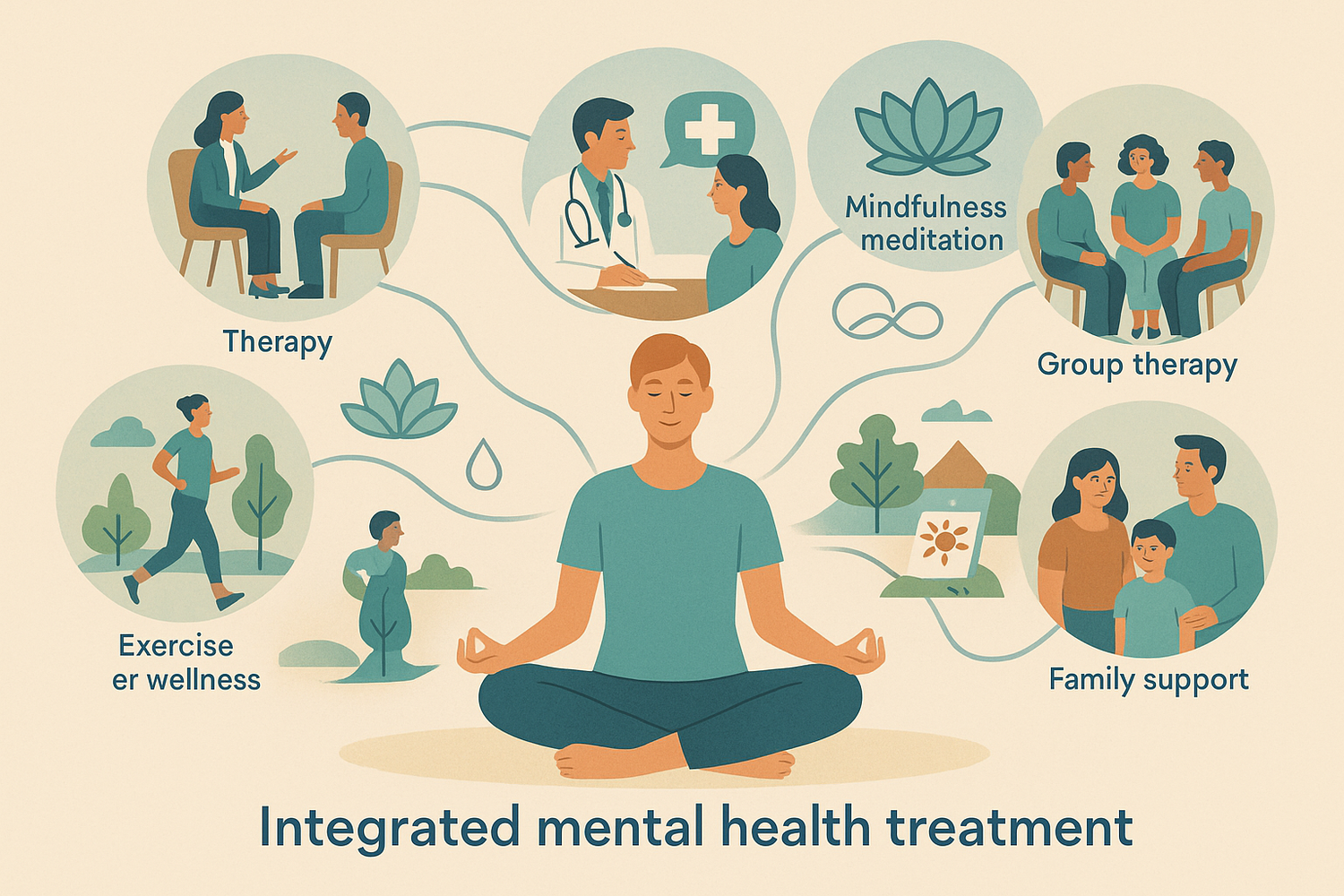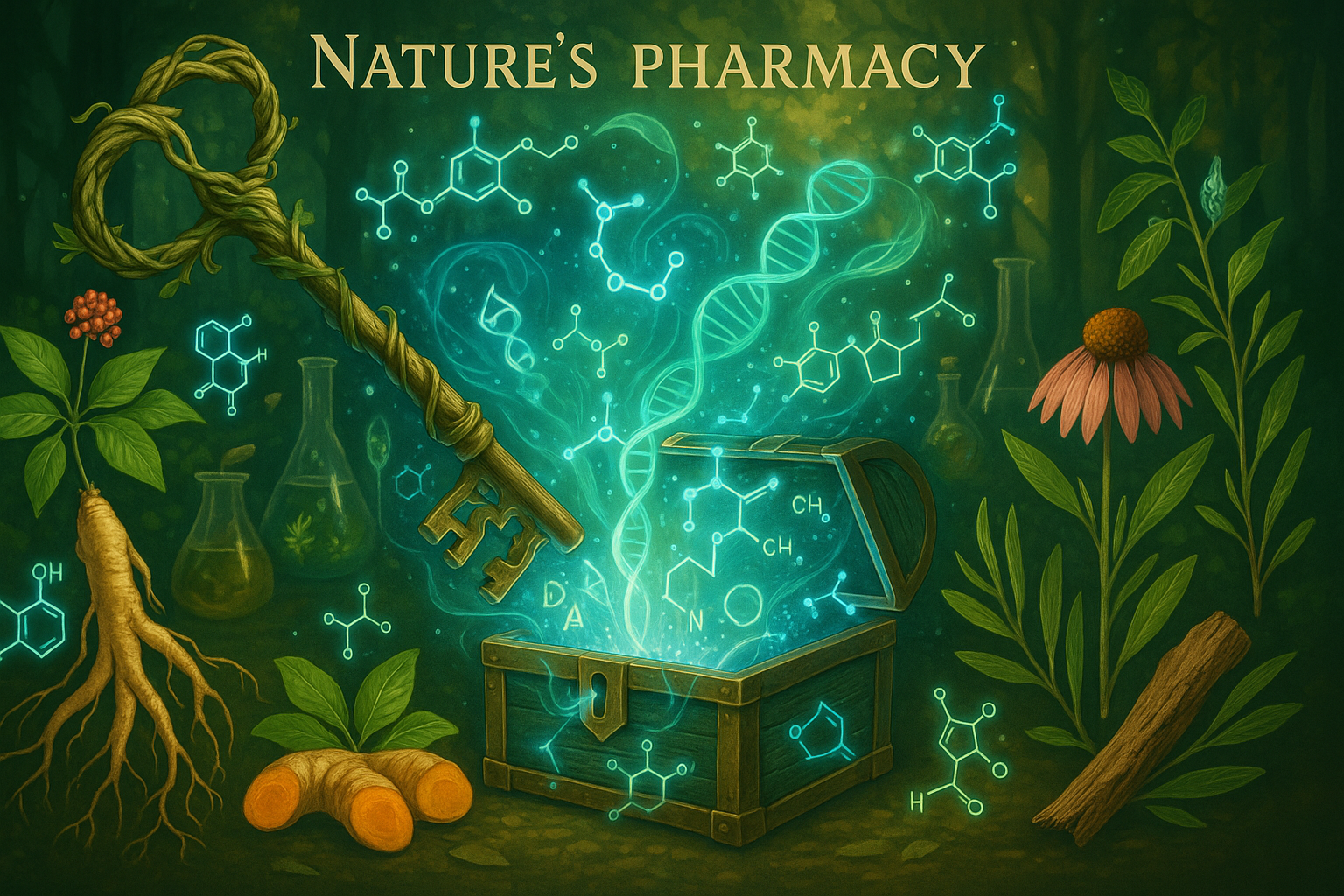Mental health treatment includes various methods to deal with mental health disorders. Traditional approaches usually involve medications and psychotherapy, which aim to manage symptoms and improve daily functioning. While these conventional treatments can work well, they may not always address the root causes or consider the whole person.
An integrated approach to mental health treatment combines conventional methods with complementary medicine techniques such as nutrition, acupuncture, mindfulness therapies, and spiritual practices. This whole-person approach seeks to treat the individual holistically by addressing biological, psychological, social, and spiritual aspects.
Embracing an integrated approach to mental health treatment offers a path toward holistic well-being, aiming for enhanced outcomes and long-term wellness.
Understanding Common Mental Health Disorders
Mental health disorders are widespread, affecting millions globally and presenting a significant challenge due to their complex nature. These disorders can impact every aspect of life, from daily functioning to overall well-being.
Prevalence and Impact
Anxiety
One of the most common mental health disorders, anxiety affects approximately 40 million adults in the United States alone. It manifests through excessive worry, restlessness, and physical symptoms such as increased heart rate.
Depression
Affecting around 264 million people worldwide, depression leads to persistent sadness, loss of interest in activities, and can severely impair daily function.
Bipolar Disorder
This condition impacts about 2.8% of U.S. adults each year. It is characterized by extreme mood swings ranging from manic highs to depressive lows.
Post-Traumatic Stress Disorder (PTSD)
Often associated with traumatic events, PTSD affects about 3.5% of U.S. adults annually. Symptoms include flashbacks, severe anxiety, and uncontrollable thoughts about the event.
Obsessive-Compulsive Disorder (OCD)
OCD affects around 1% of the U.S. population. It involves unwanted repetitive thoughts (obsessions) and behaviors (compulsions).
Key Symptoms and Characteristics
Understanding symptoms helps in recognizing and addressing these disorders effectively.
Anxiety
- Physical Symptoms: Increased heart rate, sweating, trembling
- Emotional Symptoms: Excessive worry, irritability
- Behavioral Symptoms: Avoidance of anxiety-inducing situations
Depression
- Emotional Symptoms: Persistent sadness, hopelessness
- Physical Symptoms: Fatigue, changes in sleep patterns
- Cognitive Symptoms: Difficulty concentrating, indecisiveness
Bipolar Disorder
Manic Phase:
- Elevated mood or irritability
- Increased energy and activity levels
- Impulsivity
Depressive Phase:
- Persistent sadness or emptiness
- Loss of interest in activities once enjoyed
- Fatigue and lethargy
Post-Traumatic Stress Disorder (PTSD)
- Re-experiencing Symptoms: Flashbacks, nightmares
- Avoidance Symptoms: Avoiding reminders of the trauma
- Hyperarousal Symptoms: Being easily startled, feeling tense or on edge
Obsessive-Compulsive Disorder (OCD)
- Obsessions:
- Intrusive thoughts about contamination or harm
- Excessive need for order or symmetry
- Compulsions:
- Repetitive behaviors such as hand washing or checking locks
- Mental rituals like counting or repeating words silently
Addressing these disorders requires a nuanced understanding of their prevalence and impact. An integrated approach considers these complexities to provide comprehensive care tailored to individual needs.
The Components of an Effective Integrated Mental Health Treatment Plan
An integrated health approach to mental health treatment seamlessly combines various therapeutic modalities, emphasizing holistic well-being. This plan involves addressing biological, psychological, social, and spiritual aspects to promote a balanced and comprehensive treatment strategy.
1. Biological Considerations in Integrated Care
The Role of Functional Medicine in Addressing Biochemical Imbalances
Functional medicine plays a pivotal role in integrated mental health care by focusing on the root causes of mental disorders rather than merely treating symptoms. This approach involves:
- Individualized Assessments: Functional medicine practitioners use comprehensive testing to identify biochemical imbalances such as nutrient deficiencies, hormone irregularities, heavy metal toxicity, and food sensitivities. These assessments help create personalized treatment plans tailored to each individual's unique needs.
- Targeted Interventions: Once the underlying causes are identified, targeted interventions are employed to restore balance. For instance, if a patient is found to have a deficiency in essential fatty acids or B vitamins, supplementation can be prescribed. Hormone imbalances might be addressed through bioidentical hormone replacement therapy.
- Holistic Monitoring: Continuous monitoring ensures that the interventions are effective and adjusted as needed. This dynamic approach helps maintain biochemical equilibrium and supports long-term mental health stability.
Functional medicine's emphasis on personalized care and root cause resolution makes it a cornerstone of an effective integrated mental health treatment plan.
Importance of Nutritional Support for Mental Well-being
Nutrition profoundly impacts mental health. A well-balanced diet provides the necessary nutrients for optimal brain function and emotional regulation. Key considerations include:
- Essential Nutrients: Certain nutrients are critical for brain health. Omega-3 fatty acids, found in fish oil and flaxseeds, are known to reduce inflammation and support neurotransmitter function. B vitamins play a crucial role in energy production and cognitive function.
- Gut-Brain Connection: The gut microbiome influences mental health through the gut-brain axis. Probiotics and prebiotic-rich foods like yogurt, kimchi, and garlic can enhance gut health, subsequently improving mood and cognitive function.
- Antioxidants: Foods rich in antioxidants, such as berries, dark chocolate, and green leafy vegetables, protect the brain from oxidative stress and inflammation. These protective effects support overall mental well-being.
Incorporating nutritional support into an integrated treatment plan addresses one of the fundamental pillars of mental health care—ensuring that the body receives the building blocks it needs for optimal brain function.
2. Psychosocial Approaches for Emotional Balance
Exploring psychosocial strategies adds another layer to an integrative mental health approach. Mindfulness therapies cultivate present-moment awareness while healthy relationships provide essential social support networks.
3. Cultivating Wholeness through Spiritual Exploration
Spirituality contributes significantly to mental health by providing meaning and purpose. Exploring this transpersonal dimension can lead to greater self-awareness and emotional resilience.
By integrating biological considerations with psychosocial strategies and spiritual exploration, an effective mental health treatment plan addresses all facets of well-being for a holistic approach to care.
2. Psychosocial Approaches for Emotional Balance
An integrative health approach to mental well-being considers the psychological and social dimensions critical for emotional balance. Mindfulness therapies and social support networks play pivotal roles in this framework.
Understanding the Benefits of Mindfulness Therapies in Cultivating Present-moment Awareness
Mindfulness therapies, such as meditation and yoga, encourage you to focus on the present moment. This practice can significantly reduce symptoms of anxiety and depression by breaking cycles of negative thought patterns.
- Meditation: Practicing mindfulness meditation helps you develop a state of calm and clarity. It allows you to observe your thoughts without judgment, fostering a sense of inner peace.
- Yoga: Combining physical postures with breath control, yoga serves not only to strengthen your body but also to enhance mental resilience. It's a form of active meditation that can improve mood and decrease stress levels.
Studies suggest that mindfulness-based cognitive therapy (MBCT) effectively prevents relapse in individuals who have experienced multiple episodes of depression. By integrating MBCT into your treatment plan, you can cultivate greater emotional stability and mental fortitude.
Harnessing the Power of Healthy Relationships: The Significance of Social Support Networks in Recovery
Social support networks are a cornerstone in the recovery process for those dealing with mental health challenges. Building healthy relationships provides emotional comfort and practical assistance, which are crucial for sustained well-being.
- Family Support: Engaging family members in your treatment plan can offer both emotional backing and accountability. Family therapy sessions can improve communication and understanding among members, creating a more supportive home environment.
- Friends and Peer Groups: Surrounding yourself with empathetic friends or joining peer support groups can provide a sense of belonging and validation. These connections can reduce feelings of isolation and loneliness.
Research shows that strong social support networks are linked to improved outcomes in mental health treatment, including faster recovery times and lower rates of relapse. In an integrated care model, fostering these relationships is as important as any medical or therapeutic intervention.
Both mindfulness therapies and robust social support systems contribute significantly to an integrative approach by addressing the psychosocial aspects that traditional treatments might overlook.
3. Cultivating Wholeness through Spiritual Exploration
Exploring the Transpersonal Dimension: How Spirituality Contributes to Mental Health and Wholeness
An integrative health approach recognizes the profound impact of spirituality on mental well-being. Embracing a multidimensional strategy for comprehensive healing, it incorporates various spiritual practices to foster wholeness.
Key aspects of spirituality in mental health include:
- Sense of Purpose: Connecting with a higher purpose or meaning in life can enhance resilience and emotional stability.
- Inner Peace: Practices such as meditation, yoga, and mindfulness can help cultivate inner tranquility, reducing stress and anxiety.
- Community and Belonging: Engaging in spiritual communities provides social support, enhancing feelings of connection and reducing loneliness.
Transpersonal psychology explores these dimensions by focusing on experiences that transcend the personal self, offering valuable insights into human consciousness and potential. This approach aligns well with functional medicine, emphasizing the interconnectedness of mind, body, and spirit.
Integrating spiritual practices into mental health treatment plans can:
- Enhance Self-awareness: Techniques like mindfulness meditation encourage self-reflection, helping individuals understand their thoughts and emotions better.
- Promote Compassion: Spiritual teachings often emphasize empathy and compassion, fostering healthier relationships.
- Encourage Positive Lifestyle Changes: Many spiritual traditions advocate for healthy living practices, such as balanced nutrition and regular physical activity.
"Meditation has been shown to alter brain function positively, promoting relaxation and improving emotional regulation."
Including spirituality within an integrative framework supports a more holistic view of health. It acknowledges that nurturing the spirit is just as crucial as addressing biological imbalances or psychological distress.
This multidimensional approach ensures that treatment plans are not only personalized but also comprehensive. By integrating traditional methods with spiritual exploration, you can achieve a state of wholeness that encompasses every aspect of your being.
Incorporating these elements into your routine might involve:
- Regular participation in meditation or yoga classes
- Engaging in community service through spiritual organizations
- Exploring philosophical or religious texts for personal growth
Understanding the transpersonal dimension provides a fuller picture of mental health, emphasizing the need for a holistic approach that considers every facet of human existence.
Personalized Assessment and Treatment Planning in an Integrated Framework
Personalized assessment is the foundation of an integrated approach to mental health treatment. It starts with a thorough evaluation to understand the specific factors that contribute to someone's mental health condition. Through detailed assessments, healthcare providers can gather important information about:
- Medical history
- Genetic predispositions
- Nutritional status
- Psychological well-being
- Social environment
The aim is to identify underlying causes and create interventions that target individual needs. For example, someone with chronic anxiety might have nutritional deficiencies or hormonal imbalances that need to be addressed.
The Importance of Thorough Evaluation in Guiding Targeted Interventions
A comprehensive evaluation helps in designing targeted interventions that are more effective than general treatments. This process often involves:
- Functional medicine testing: Identifying nutrient deficiencies, hormone levels, and potential toxins.
- Psychological assessments: Understanding emotional triggers, cognitive patterns, and behavioral tendencies.
- Social evaluations: Examining the quality of relationships and social support networks.
These evaluations provide a detailed understanding of the person's condition, leading to more precise and impactful treatment plans.
Creating Comprehensive and Flexible Treatment Plans Tailored to Each Person's Needs
Once all the necessary information has been gathered, the next step is creating personalized treatment plans. These plans take a holistic approach, considering not only symptoms but overall well-being. Key elements often include:
- Nutritional therapy: Addressing deficiencies and optimizing diet for mental health.
- Mindfulness practices: Techniques such as meditation or yoga to improve emotional control.
- Therapeutic interventions: Cognitive Behavioral Therapy (CBT), psychotherapy, or other approaches tailored to individual needs.
- Lifestyle adjustments: Incorporating exercise routines, good sleep habits, and stress management techniques.
- Social support strategies: Building stronger social connections through group therapy or family counseling.
Tailored treatments ensure that every aspect of a person's life that affects their mental health is taken into account. This holistic approach promotes lasting recovery and overall well-being.
Personalized assessment and individualized treatment plans are essential for effective integrated mental health care, ensuring targeted interventions that specifically address each person's unique needs.
Embracing a Career in Integrated Mental Health Counseling
Overview of the Mental Health Counseling Field with an Emphasis on the Value of Integration
Mental health counselors play a pivotal role in supporting individuals through emotional, psychological, and social challenges. They use proven methods to help clients deal with issues like anxiety, depression, trauma, and relationship conflicts. Recently, there has been more recognition of the importance of integration in mental health counseling. This means combining traditional therapy techniques with other approaches like nutrition, mindfulness, and exploring spirituality. The goal is not just to treat symptoms but also to improve overall well-being.
Educational Pathways and Licensure Prerequisites for Aspiring Mental Health Counselors
Becoming a mental health counselor involves several important steps for education and licensure:
- Undergraduate Degree: Start by getting a bachelor's degree in psychology or counseling. This will cover essential topics like how people develop, abnormal psychology, and basic counseling methods.
- Graduate Studies: Next, you can choose to get a graduate certificate in mental health or a master's degree specifically in mental health counseling. These programs go more in-depth into advanced therapy techniques, ethical issues, and specialized areas like integrated care.
- Licensure Requirements:
- Complete supervised clinical hours as part of your graduate program.
- Pass licensing exams that are specific to your state so you can become a licensed professional counselor (LPC).
- Keep learning through continuing education to keep your license active and stay updated on the best ways to help clients.
These steps make sure that counselors are ready to effectively support different clients.
Advantages of Specializing in Integrated Approaches within the Counseling Profession
Choosing to specialize in integrated approaches has several benefits for mental health counselors:
- Comprehensive Care: By using different methods like nutrition guidance, mindfulness practices, and exploring spirituality, you can provide more well-rounded care that looks at all parts of a client's life.
- Better Results for Clients: Integrated care often leads to clients sticking with their treatment plan better and having fewer setbacks. They get personalized help that considers their unique physical, emotional, social, and spiritual needs.
- Professional Growth: Specializing in integrated methods can make you stand out in the field. It opens up chances for more training and becoming an expert in a certain area, which makes you very valuable to teams that have different kinds of specialists.
- Putting Clients First: This specialization encourages a more client-focused approach where treatment plans are made just for them instead of using the same plan for everyone. It promotes working together with clients to come up with strategies that fit their needs for healing and personal development.
Choosing to use an integrated approach not only makes your professional work better but also greatly improves the lives of the people you help.
The Future of Mental Healthcare: Advancements in Integrative Medicine
Innovations in integrative medicine are set to transform the future of mental healthcare. Emerging technologies and research are enhancing our understanding of how to treat mental health disorders holistically.
Potential Developments:
- Telehealth and Digital Therapeutics: Online platforms and apps are making integrative therapies more accessible. Virtual consultations, mobile mindfulness apps, and digital therapy programs are bridging gaps in traditional care models.
- Personalized Medicine: Advances in genetic testing and biomarker analysis allow for highly individualized treatment plans. These tailored approaches aim to address unique biochemical imbalances and nutritional needs.
- Neurofeedback and Brain Stimulation: Techniques such as transcranial magnetic stimulation (TMS) and neurofeedback are gaining traction. These non-invasive methods offer promising results for conditions like depression, anxiety, and PTSD.
Challenges Ahead:
- Integration into Mainstream Healthcare: Despite its benefits, integrative medicine faces barriers in mainstream acceptance. Insurance coverage, lack of standardized protocols, and limited practitioner training can impede widespread adoption.
- Evidence-Based Validation: Continued research is crucial for validating the efficacy of integrative treatments. Large-scale studies and clinical trials are needed to establish best practices and secure credibility within the medical community.
By focusing on these developments while addressing the associated challenges, the future of mental healthcare can significantly improve patient outcomes through a more holistic approach.
Conclusion
Embracing an integrative approach to mental health treatment can lead to enhanced outcomes and long-term wellness. By combining traditional methods with complementary approaches, you address the root causes of mental health disorders holistically. This comprehensive strategy not only aims to alleviate symptoms but also promotes overall holistic well-being.
Seeking support from qualified professionals who champion a holistic vision of care is essential. These experts can guide you through personalized treatment plans that incorporate:
- Nutritional support
- Mindfulness therapies
- Spiritual exploration
Taking an integrated path empowers you to cultivate joy, productivity, and happiness. It enhances life satisfaction and reduces the likelihood of relapse compared to traditional treatments alone.
For those aiming for optimal mental health, considering an integrative approach provides a balanced and enriched pathway to well-being.
FAQs (Frequently Asked Questions)
What is the thesis statement for embracing an integrated approach to mental health treatment?
The thesis statement is to embrace an Integrated Approach to Mental Health Treatment for Holistic Well-being.
What are some common mental health disorders?
Common mental health disorders include anxiety, depression, bipolar disorder, post-traumatic stress disorder (PTSD), and obsessive-compulsive disorder (OCD).
What are the components of an effective integrated mental health treatment plan?
The components include biological considerations in integrated care, psychosocial approaches for emotional balance, cultivating wholeness through spiritual exploration, personalized assessment and treatment planning in an integrated framework, and embracing a career in integrated mental health counseling.
How does functional medicine address biochemical imbalances in integrated care?
Functional medicine plays a role in addressing biochemical imbalances, while nutritional support is also important for mental well-being.
Why is mindfulness therapy important in an integrated approach to mental health treatment?
Mindfulness therapies are important in cultivating present-moment awareness, which contributes to comprehensive healing.
What are the educational pathways and licensure prerequisites for aspiring mental health counselors?
Aspiring mental health counselors can pursue a graduate mental health certificate or an undergraduate degree in psychology or counseling. They must also meet specific education and licensure requirements to practice as licensed professional counselors.







Leave a comment
This site is protected by hCaptcha and the hCaptcha Privacy Policy and Terms of Service apply.